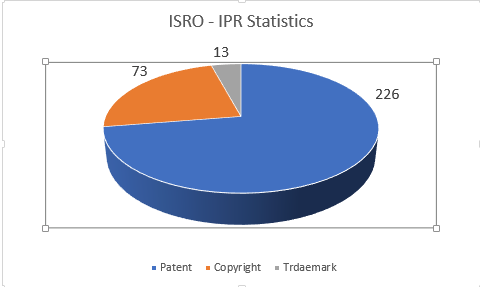The Indian Space Research Organization (ISRO) stands as a testimony to India’s prowess in space science and technology. Established in 1969, ISRO’s mission has been to advance space technology and use its applications for various national tasks.
Origins and Evolution:
ISRO’s roots trace back to 1962 when pioneering space activities were initiated under Dr. Vikram Sarabhai, often regarded as the father of the Indian space program. ISRO replaced the erstwhile Indian National Committee for Space Research (INCOSPAR).
ISRO has a rich history of innovations and technological advancements in space research and exploration. Recognizing the value of its intellectual property resulting from these efforts, ISRO has put in place robust Intellectual Property Rights (IPR) mechanisms to protect and manage its inventions, designs, and other creations. Here’s an overview of ISRO’s IPR activities:
1. Patent Filings:
ISRO had filed the first patent in around 1973 and regularly files the patents thereafter for various technological inventions and innovations emerging from its research centres. These patents range across various domains, from satellite technology to launch vehicle innovations. Till the date, ISRO has filed over 370 patents. ISRO’s Patent portfolio contains around 226 active patents across globe.
ISRO has filed its latest patent in July 2023 under application no. 202341049819 in the mechanical field which was published in the Indian Patent Journal on September 01, 2023.
ISRO, also has few of active patents in USA, China, Russia, Japan, Europe, Singapore, South Africa, etc.
2. Trademark Protection:
As of now, ISRO has 13 trademarks registered. To protect its identity and credibility, ISRO has registered its name, logo, and certain specific mission logos as trademarks. This ensures that the brand’s reputation is not misused or misrepresented. A few Trademarks registered by ISRO are ISROSIL, ISROVISION, SACIMAGE, ANTRIX, etc.
3. Copyright Issues:
Software developed by ISRO, as well as certain publications and multimedia content, are safeguarded under copyright laws. This ensures that the organization’s proprietary content isn’t distributed or copied without proper authorization. Till the date, 73 copyrights are registered in the name of ISRO.
In addition to managing IPR portfolio, ISRO conducts the IPR training sessions and workshops to make its scientists and researchers aware of IPR-related issues. This ensures that innovations are timely reported and protected.
Essentially, we need to determine whether it’s crucial for ISRO to publish patents. What benefits arise when they make these patents public? Conversely, what are the advantages if they keep these patents confidential? Is this approach more about branding, or does it truly benefit our nation? Can such tech be a trade-secret? Who else will copy/duplicate this technology in India?
What are your thoughts on this?



